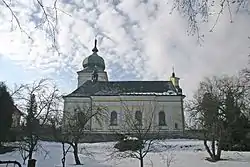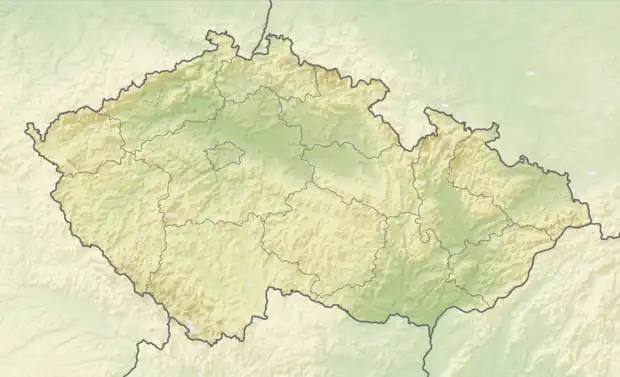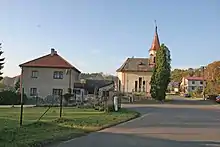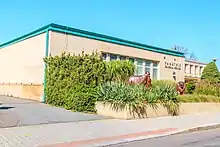Holice
Holice (Czech pronunciation: [ˈɦolɪtsɛ]; German: Holitz) is a town in Pardubice District in the Pardubice Region of the Czech Republic. It has about 6,800 inhabitants.
Holice | |
|---|---|
 Church of Saint Martin | |
 Flag  Coat of arms | |
 Holice Location in the Czech Republic | |
| Coordinates: 50°3′58″N 15°59′9″E | |
| Country | |
| Region | Pardubice |
| District | Pardubice |
| First mentioned | 1336 |
| Government | |
| • Mayor | Ondřej Výborný |
| Area | |
| • Total | 19.65 km2 (7.59 sq mi) |
| Elevation | 244 m (801 ft) |
| Population (2023-01-01)[1] | |
| • Total | 6,813 |
| • Density | 350/km2 (900/sq mi) |
| Time zone | UTC+1 (CET) |
| • Summer (DST) | UTC+2 (CEST) |
| Postal code | 534 14 |
| Website | www |
Administrative parts

Town parts and villages of Kamenec, Koudelka, Podhráz, Podlesí, Roveňsko and Staré Holice are administrative parts of Holice.
Geography
Holice is located about 14 km (9 mi) east of Pardubice. It lies in a flat landscape of the East Elbe Table lowland. The highest point is the hill Kamenec at 328 m (1,076 ft) above sea level. The Ředický stream flows through the town.
History
The first written mention of Holice is from 1336, when it was property of John of Bohemia as a part of the Chvojno estate. The settlement was probably founded at the end of the 13th century. From the mid-14th century until the Hussite Wars, the village belonged to the Sternberg family. In the second half of the 15th century, Holice became a market town with a fortress and a church and became the centre of the estate. In 1481, Neptalim of Frimburk acquired Holice. During his rule, Holice prospered and acquired various privileges, including exemption from paying taxes, exemption from corvée and the right to brew beer.[2]
In 1507, Vilém II of Pernštejn became the owner of the town. From that time until the establishment of a sovereign municipality in 1849, Holice was part of the Pardubice estate. In 1641, during the Thirty Years' War, Holice acquired the right to build a salt warehouse on its territory, but two years later the town was burned down by the Swedish army. Holice was also hit by other fire disasters in 1679 and 1680. The town then prospered until 1758, when it was ravaged by the army of Prussian King Frederick the Great during the Seven Years' War. But after the war, the market town recovered and prospered again.[2]
At the end of the 19th century, the railway was built. At the beginning of the 20th century, the very first bus line, which ran from Pardubice to Holice, was launched. In 1931, Holice was promoted to a town.[2]
Demographics
|
|
| ||||||||||||||||||||||||||||||||||||||||||||||||||||||
| Source: Censuses[3][4] | ||||||||||||||||||||||||||||||||||||||||||||||||||||||||
Sport
Near the village of Kamenec is a motocross track which bears the name of Michael Špaček.
Sights

The main landmark of Holice is the Church of Saint Martin. It is a late Baroque church, built in 1736–1739.[5]
The African Museum of Dr. Emil Holub is a museum dedicated to Emil Holub, the most notable local native. It was originally a memorial hall opened in 1956 and later a memorial, which was renamed the museum in 2012.[6]
Notable people
- Emil Holub (1847–1902), African explorer
- Harry Horner (1910–1994), art director and set designer
- Václav Lohniský (1920–1980), actor
- Jan Kačer (born 1936), actor and director
References
- "Population of Municipalities – 1 January 2023". Czech Statistical Office. 2023-05-23.
- "Historie města" (in Czech). Město Holice. Retrieved 2023-07-25.
- "Historický lexikon obcí České republiky 1869–2011 – Okres Pardubice" (in Czech). Czech Statistical Office. 2015-12-21. pp. 3–4.
- "Population Census 2021: Population by sex". Public Database. Czech Statistical Office. 2021-03-27.
- "Kostel sv. Martina" (in Czech). National Heritage Institute. Retrieved 2023-05-13.
- "Historie holického památníku a muzea" (in Czech). African Museum of Dr. Emil Holub. Retrieved 2021-10-12.
- "O městě" (in Czech). Město Holice. Retrieved 2023-07-25.